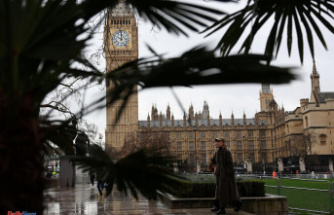The summer wave surges across Germany. Federal Minister of Health Karl Lauterbach fears that the situation will worsen in autumn and insists on plans to be able to contain the pandemic. (Read more about this here.) And once again the tiresome Corona issue is causing a dispute. Because once again it is about the protective measures - which some consider overdue and others consider excessive.
The current sticking point: the obligation to isolate. The current Infection Protection Act stipulates that infected people must be isolated at home for five days. Before returning to work, employees in healthcare facilities must also prove that they are negative by means of a rapid or PCR test. A five-day quarantine is strongly recommended for people who have had contact with corona infected people.
When the Infection Protection Act expires, isolation will have to be reorganized, among other things. Kassenärztechef Andreas Gassen spoke out in favor of relaxing the measure at the weekend. He advocates repealing the current regulation because it would also oblige infected people without symptoms to isolate themselves - and this would lead to staff shortages in many places.
The FDP also shares this position. A discussion about it is correct, said FDP Vice Wolfgang Kubicki to the newspapers of the Funke media group (Monday). "In my view, it is overdue, both epidemiologically and for reasons of personal responsibility, to let people make this decision again - just as other European countries have long since done."
FDP General Secretary Bijan Djir-Saai made a similar statement. He warned of staff failures due to isolation requirements. "We will face enormous challenges in systemically relevant areas if we send masses of positively tested people without symptoms into isolation," he told the "Rheinische Post" (Monday).
Gassen is launching an important debate with the proposal, said FDP health expert Christine Aschenberg-Dugnus to the editorial network Germany (RND). Vaccination protects many people from serious illnesses.
Above all, Lauterbach has to come to an agreement with the countries that issue the relevant regulations.
The Social Democrats and the Greens are on the side of the Minister of Health. The Green health politician Saskia Weishaupt advocated sticking to the rules. When people went to work, they shouldn't be at risk of getting infected, she told the Funke media group. Health Minister Karl Lauterbach (SPD) made it clear at the weekend that he did not believe in the proposal. "Infected people have to stay at home. Otherwise, not only will the number of cases increase even more, but the workplace itself will become a security risk," he wrote on Twitter.
The chairman of the German Association of General Practitioners, Ulrich Weigeldt, has also spoken out against changing the existing isolation and quarantine rules for Corona. "In my opinion, we should stick to the current, reasonable rules, which have already reduced the isolation period to five days," Weigeldt told the "Welt" on Tuesday. "Anyone who has a positive test should stay at home for a few days, even if they feel quite well."
Of course, this applies all the more if someone works in the medical field, Weigeldt said. This would prevent further infections. "I think this permanent debate is currently pointless. We have an information chaos that confuses more than it helps."
Several teachers' associations have also spoken out against an end to the corona isolation requirement. "Giving up self-isolation now would be tantamount to a contagion given the current number of infections," said the Vice Chairman of the Education and Science Union (GEW), Andreas Keller, the editorial network Germany (RND). He warned that there was a large number of infections in staff rooms in particular, which could lead to school closures. "That can't be the goal."
The Federal Chairman of the Education and Training Association (VBE), Udo Beckmann, also told the RND: "If all quarantine and protective measures are abandoned and infections can spread unhindered, there is a risk that the existing shortage of teachers will worsen to such an extent that the house of cards school is finally collapsing." The already tense staffing situation in schools has “exacerbated intolerably” due to the corona pandemic.
The President of the German Teachers' Association, Heinz-Peter Meidinger, warned that if quarantine and isolation requirements were lifted, in combination with other factors in autumn, there would be such a large wave of infections in schools "that school operations could be seriously endangered".
The health policy spokesman for the Union faction, Tino Sorge (CDU), told the "Rheinische Post" (Monday): "Fortunately, the high number of infections this summer has met a large number of vaccinated citizens." This reduces the likelihood of severe courses. "But it is also true that the traffic light does not agree on possible measures and has not yet presented a concept for autumn and winter."
Concern called for protection concepts for the elderly and those with previous illnesses. At the same time, lockdowns and school closures must be avoided and the vaccination campaign aimed at vulnerable groups and people with insufficient immune protection. "Instead of making this preparation, the government is presenting us with both shrill disaster warnings from the Minister of Health and hints from the Minister of Justice about the point of masks," criticized Sorge.
Federal Minister of Justice Marco Buschmann (FDP) recently declared that “a form of wearing masks indoors” will certainly play a role in the government’s protection concept. So far, however, the coalition has not reached an agreement on this.












